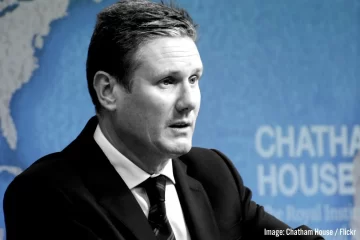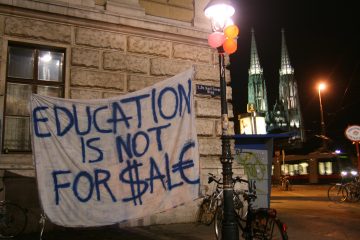On Monday 11 November I attended a last-minute rally called by the Committees for the Defence of the Republic (CDR) in central Barcelona. This was just a glimpse into the ongoing militant struggle being waged against the reactionary Spanish state, yet it reflected a mood of radicalisation and determination, especially amongst the youth.
Despite the various waves of political sentencing, blatant police brutality and savagery on the streets, this has not discouraged activists one bit from making their collective voice heard. The fact that over 300 people showed up to a rally announced just hours before is testament to this.
It was clear that for many this is not simply a struggle for independence or the freeing of political prisoners, but against the capitalist system that has nothing to offer the working class or the youth. The pressing social issues in Spain – from a lack of quality employment and affordable housing, to the the deteriorating and underfunded health service – desperately need to be resolved.
It is these very attacks to living and working conditions, alongside the political repression, that is pushing the working class and youth onto the streets with more grit and determination than in October 2017. I had the privilege of interviewing a comrade from the International Marxist Tendency and CUP (Popular Unity Candidacy) member, Arturo Rodriguez, whom has been tirelessly involved in the struggle for a socialist Republic of Catalonia.
We began by speaking about the general political turmoil within Catalonia, the election and his political work within Catalan parties. He highlighted the failures of Unidos Podemos, who previously supported the right to self-determination for the Catalan people, but have taken an ambiguous position since the arrests in 2017.
Rodriguez spoke of the CUP, a far-left pro-independence party, of which he is a member. He gave his assent of the CUP deciding to stand in the national elections. Although Rodriguez considered the two parliamentarians elected a step in the right direction, given they had previously boycotted and are relatively new to the political scene, he was critical of their general approach and strategy:
“They are paying for mistakes that they have made in the past, haven’t been able to differentiate themselves enough from the mainstream pro-independence bloc of the centre-left and centre-right. They have been talking about unity, they even supported austerity budgets in the past.”
Despite this, he argued that it reflects that there is a section of the Catalan youth, in particular, “that have broken from the moderate parties that are led by petit-bourgeois elements and are looking towards the CUP candidates very positively”. This found its echo in the revolutionary chants that were led primarily by the youth at the rally.
“Something that should be clarified is that in Spain the right to self-determination is a revolutionary task.” He continued, “The Spanish state will never accept this right, it is not as though this can be solved democratically from above or through a pact.”
Rodriguez explained that the major problem has been one of leadership. Since the pro-independence movement has been dominated by reformists, they are unable to deliver on their promises: “They talk about the Republic, they talk about independence, but they cannot deliver because this implies a revolutionary confrontation with a very powerful imperialist state.” He commented:
“To defeat such a formidable enemy, you need to win the majority of the support of the Catalan working class, first of all, which is currently divided. Part of the Catalan working class has a Spanish national identity, speaking Spanish as their primary language. They do not identify with this movement because it has failed to reach out to them on a class basis. The way to win over these people is to connect the right to self-determination with socialist transformation. These traditional parties can clearly not do this.”
The Catalan working class are becoming aware of the limits of their leadership on the basis of experience and events. Rodriguez again criticised the CUP for “generating illusions” in the traditional petit-bourgeois leadership of the movement, and stated that if they had been bolder, this process would have happened quicker. In spite of this, “it is happening on the basis of experience, haphazardly, but its happening,” he confirmed.
Rodriguez spoke enthusiastically of the organs of workers’ power that have been mushrooming around Catalonia. He explained that there have been all sorts of spontaneous and semi-spontaneous forms of rank-and-file organisations cropping up over the last few weeks. The CDR has re-emerged, and there are manifold neighbourhood associations, student societies and pro-independence Trade Unions mobilising on the streets.
However, there is a need to centralise these “embryos of people’s power” – they need to be armed with a programme of socialist transformation, with democratic leadership with a clear strategy of struggle. That is what is lacking.
It was plain as day that the perspectives are one of extreme instability. The Catalan national question cannot be resolved from above, but only through a revolutionary struggle for a socialist Republic.
The differentiation within the movement is clearly going to accelerate, and Rodriguez predicted that “there is going to be a big chunk of the pro-independence movement that will break from its traditional leadership.” He continued:
“We need to build a revolutionary bastion for this movement, this is what I am pushing for. There needs to be the creation of assemblies in every workplace, in every neighbourhood, independent of and in defiance to the Spanish state. We must orientate the movement further to the left, and it must be much more rooted in the working class. Only on this basis would be able to give this struggle the revolutionary character it needs to succeed.”
The MSF supports that stated aims and analysis of our comrade Rodriguez, and we offer our solidarity with to the Catalan working class and youth.
Freedom for Catalan political prisoners!
Solidarity with the mobilisation of the Catalan masses!
For a Catalan Socialist Republic as a spark of the Iberian Revolution!
Khaled Malachi, Cambridge Marxist Society




0 Comments